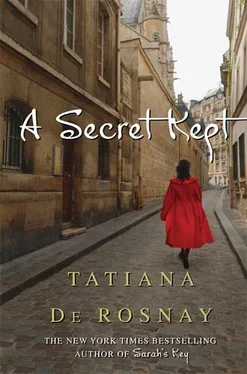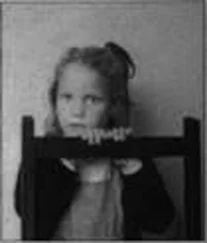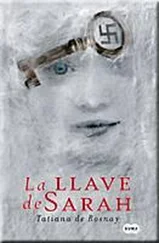I don’t need to look at him to guess that his eyes are full of tears. I don’t need to look at Mélanie either. I finish my cigarette and toss it out of the window into the courtyard. Icy air comes blasting in. In the next room, music comes on, startlingly loud. I glance at my watch. It is getting on for six o’clock, and night has fallen.
“We need you to let us back into our grandmother’s apartment,” says Mélanie, her voice still shaky.
Gaspard nods humbly. “Of course.”
During the entire way down, no one breathes a word.

The nurse leads us into the large, shuttered bedroom, where we can barely make out a hospital bed, its back slightly upright, and the diminutive form of our grandmother on top of it. We politely ask the nurse to leave, as we need to talk to our grandmother in private. She obeys.
Mélanie turns the bedside lamp on, and we can at last see our grandmother’s face. Blanche has her eyes closed, and her eyelids flutter when she hears Mélanie’s voice. She looks old and tired, and fed up with life. Her eyes open slowly and they linger on Mélanie’s face and then mine. No reaction. Does she even remember who we are? Mélanie takes her hand, talks to her. Again the eyes, going from Mel to me silently. A thick necklace of wrinkles along her shriveled neck. Getting on for ninety-four, I calculate.
The room around us has not changed either. Heavy ivory curtains, thick carpets, a bookshelf, a coiffeuse in front of the window, with the familiar objects that have been there forever: a Fabergé egg, a gold snuffbox, a small marble pyramid, and the same photographs that gather dust in their silver frames: our father and Solange as children, Robert, our grandfather, then Mel, Joséphine, and me. A couple of photos of my children when they were babies. None of Astrid. Nor of Régine. And none of our mother.
“We want to talk to you about our mother,” says Mélanie clearly. “About Clarisse.”
The eyelids flicker again and close. This looks like a dismissal.
“We want to know about the day she died,” Mélanie goes on, ignoring the closed eyelids.
The parched eyelids quiver open, and Blanche looks at both of us in silence for a long time. I am certain she is not going to say a word.
“Can you tell us what happened here on February twelfth, 1974, Grand-mère?”
We wait. Nothing. I want to tell Mélanie this is hopeless. Not going to work out. But all of a sudden Blanche’s eyes seem to open even wider, and there is a peculiar expression in them, something almost reptilian, which disturbs me. I watch her dried-up chest heave laboriously. The eyes don’t blink, staring out at us, glowering at us, defiant, dark spots in a deathly, skull-like countenance.
As the minutes crawl by, I begin to understand that my grandmother will never speak, that she will take what she knows to her grave. And I loathe her for it. I loathe every inch of her repulsive, crumpled skin, every inch of what she is, Blanche Violette Germaine Rey née Fromet, from the sixteenth arrondissement, born to wealth, born to prosperity, born to excellence.
We stare at each other, my grandmother and I, for what seems an eternity, causing Mélanie to glance from her to me, taken aback. I make sure Blanche receives the entirety of my abhorrence, that she gets the full blast of it, up front, spilling out onto her immaculate nightdress. My disdain for her is such that it has me shaking from head to toe. My hands itch to grab one of the embroidered pillows and smother the white face, to snuff out the arrogance in those blazing eyes.
It is a fierce, silent battle between her and me, and it lasts forever. I can hear the ticktock of the silver alarm clock on the bedside table, the footsteps of the nurse just behind the door, the subdued roar of the traffic along the tree-lined avenue. I can hear my sister’s nervous breathing, the wheeze of Blanche’s old lungs, my own heart thumping the way it did in Gaspard’s room, moments ago.
Finally the eyes close. Very slowly, Blanche’s gnarled hand creeps over the coverlet like a desiccated insect and presses on a bell. A strident ring is heard.
The nurse instantly steps in.
“Madame Rey is tired now.”
We leave in silence. Gaspard is nowhere to be seen. As I go down the stairs, ignoring the elevator, I think of my mother being carried out right here, on a stretcher, wearing her red coat. My chest feels tight.
Outside, it is colder than ever. Mélanie and I find we cannot talk to each other. I am shattered, and by the pallor of her face, I know Mélanie is too. I light up a cigarette while she turns to her phone, checks it. I offer to drive her home. From the Trocadéro to the Bastille, the traffic is dense on a Saturday evening, as usual. We don’t speak, but I know she is thinking exactly the same thoughts.
The truth about our mother’s death. Something so monstrous that for the moment, not talking about it keeps it at bay.

Parimbert’s personal assistant is a beefy woman called Claudia who hides her excess fat beneath a billowing black dress that looks like a cassock. She talks to me in a patronizing, irritatingly amicable way. First thing on Monday morning she is already on the phone, harassing me about the Think Dome deadline. The project has been accepted by Parimbert, but a new delay has come from one of my suppliers, who is not on time delivering the special luminous screens I ordered, which changed color constantly and formed the dome’s entire interior. On another day, at another point, I would have submissively sat back and let this woman haggle. Not anymore. I think of her caffeine-stained teeth, her furry upper lip, her patchouli perfume, her Mozartean Queen of the Night screeches, and my disgust, impatience, and annoyance bubble up with just enough energy to detonate with the efficient precision of a pressure cooker. It does me so much good it almost feels like the aftermath of sex. I can hear Florence gasping in the next room.
I slam down the phone. Time for a quick smoke in the chilly courtyard. I slip into my coat. Then my phone rings. It is Mélanie.
“Blanche is dead,” she announces flatly. “Passed away this morning. Solange just called me.”
Blanche’s death does nothing to me. I did not love her. I will not miss her. The detestation I felt at her bedside on Saturday is still fresh. Nevertheless, she was my father’s mother, and I think of him. I know I should call him. I should call Solange. I don’t. I go smoke my cigarette out in the cold. I think of the difficult days ahead concerning Blanche’s inheritance and how Solange and my father will fight. It will get ugly. It already did a couple of years ago, and Blanche wasn’t even dead yet. We were kept out of it. Nobody told us, but we knew there were conflicts and complications between brother and sister. Solange felt that her brother, François, was the favorite sibling, that he had always been advantaged. After a while she stopped seeing him. And us.
Mélanie asks if I want to come by later and see Blanche’s body. I tell her I will think about it. I sense a tiny distance between my sister and me, a new one-one that wasn’t there before, one I have never felt. I know she didn’t approve of my aloofness toward Blanche, the way I stared down at her on Saturday, the way I showed her my true feelings. Mélanie asks if I have called our father yet. I say I will. Again, she sounds as though she disapproves. She tells me she is on her way to see our father. And the way she says it hints that I should be doing that as well. Fast.
When finally I get to my father’s place, it is evening. Margaux is silent during the drive, earphones in her ears, eyes riveted to her cell phone, fingers flying as she texts message after message. Lucas is in the back, engrossed by his Nintendo. I feel as if I am alone in the car. Modern kids are the most silent brand ever.
Читать дальше













